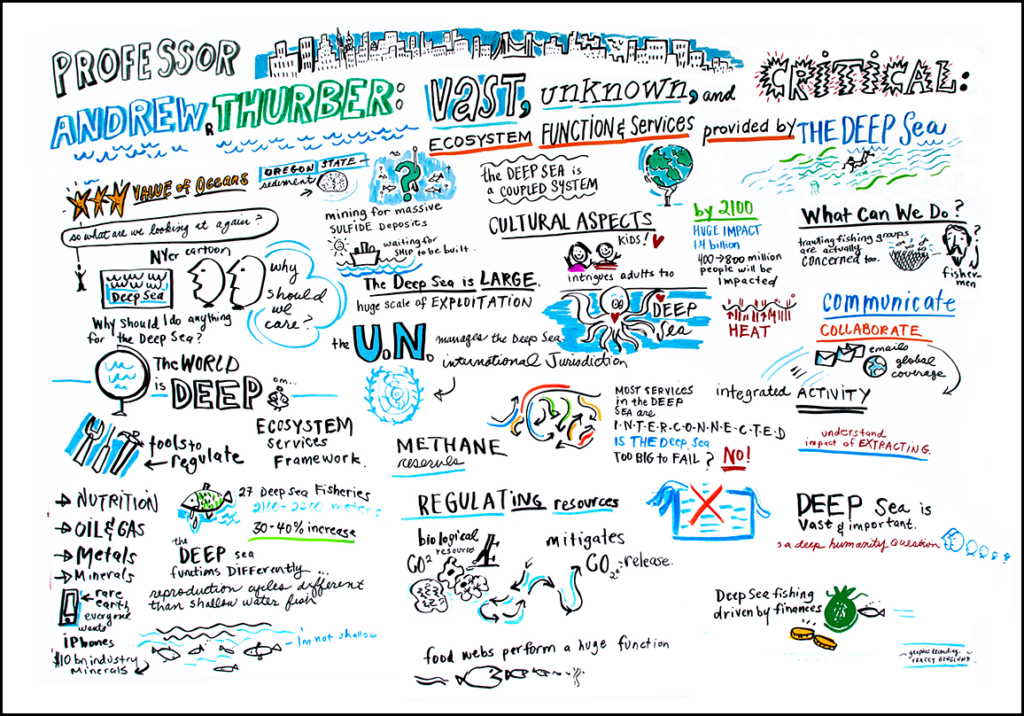The ocean provides humanity with life-supporting ecosystem services. At the same time, humans subject the ocean to stresses that lead to environmental changes (ocean warming, sea level rise, acidification, and deoxygenation, for example), a loss of biodiversity, decreasing fish stocks, and an increase in toxins and microplastics in the ocean. These multidimensional stressors compromise the functioning of marine ecosystems.
Complex interactions in the global ocean system require globally coordinated action.
The United Nations acknowledged at a summit in September 2015 that ocean sustainable development is crucial for human prosperity. Seventeen sustainable development goals (SDGs) were defined to ensure peace and prosperity for all, recognizing Earth’s limitations and the need to increase global partnerships. Among these is an explicit ocean goal to “conserve and sustainably use the oceans, seas and marine resources.”
Shortly after the SDG summit, 50 former and current scientists of the Future Ocean Cluster from Kiel, Germany, met in New York with researchers from the Earth Institute at Columbia University to discuss integrated ocean science in support of sustainable ocean development. The symposium emphasized the need for both a deep, fundamental understanding of specific aspects of the ocean system and integrative approaches to limit and transform human activities to safeguard key marine ecosystem functions and services.
The conference centered on three areas requiring increased scientific engagement:
- Ocean discovery and understanding: there is a gap in knowledge of the consequences of exploiting the ocean, the deep sea in particular, for the Earth system and human well-being.
- Ocean observation and prediction: complex interactions in the global ocean system require globally coordinated action, including assessments of the state of the ocean system and the effects of natural variability versus human activity.
- Ocean futures and governance: enhanced engagement in marine spatial planning and ocean conservation is necessary for systematic exploration of ocean futures under various ocean development scenarios.

Focusing on the Big Picture
The conference emphasized that even though nations and regions have established policies on the sustainable use of coastal zones (e.g., U.S. National Ocean Policy, New Zealand Coastal Policy Statement, European Coastal and Marine Policy), global assessments are lacking on fisheries, resource extraction, coastal development, urbanization, and ocean economic wealth.
Global assessments are lacking on fisheries, resource extraction, coastal development, urbanization, and ocean economic wealth.
Improved scientific bases and assessments for understanding ocean systems holistically (e.g., the United Nations World Ocean Assessment) provide a unique opportunity to use ocean system models in creating sustainable ocean development scenarios for time frames of decades or centuries. The interaction between different spheres (scientific, political, public) and time scales calls for more complete, integrated, and innovative ocean research with appropriate data handling and free and open information sharing.
Programs like the World Climate Research Programme and Future Earth provide ideal avenues to continue the scientific conversation on sustainable ocean development. Still, new ways of enhancing implementation of and compliance with global and regional ocean governance need to be explored, calling for transdisciplinary approaches in ocean sciences and ocean awareness on a global scale.
This conference was supported by the German Federal Ministry of Education and Research within the sponsorship program Research Alumni Meetings Abroad, administered by the Alexander von Humboldt Foundation, with additional support from the Earth Institute, Columbia University, and the German Center for Research and Innovation.
—Gesche Braker, Cluster of Excellence “The Future Ocean,” Kiel University, Kiel, Germany; email: [email protected]; Martin Visbeck, GEOMAR Helmholtz Centre for Ocean Research Kiel, Kiel, Germany; and Nancy Susan Smith, Cluster of Excellence “The Future Ocean,” Kiel University, Kiel, Germany
Citation:
Braker, G.,Visbeck, M., and Smith, N. S. (2016), Integrated marine research for sustainable ocean development, Eos, 97, https://doi.org/10.1029/2016EO055161. Published on 06 July 2016.
Text © 2016. The authors. CC BY-NC-ND 3.0
Except where otherwise noted, images are subject to copyright. Any reuse without express permission from the copyright owner is prohibited.

